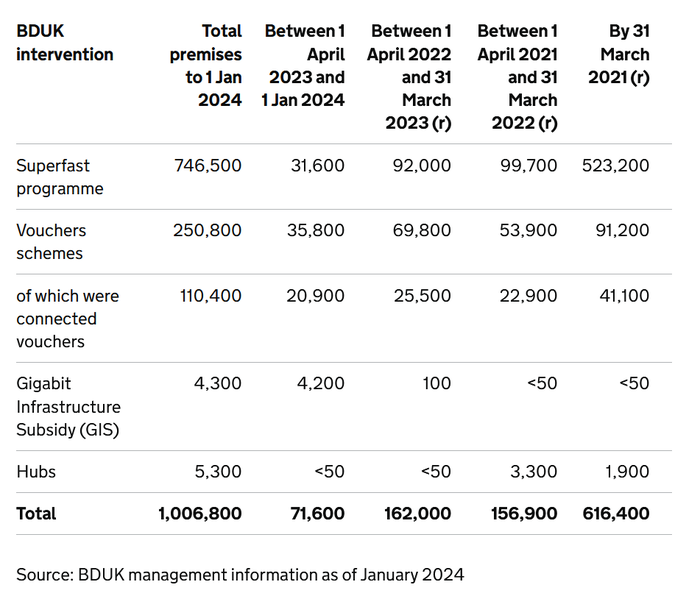Project Gigabit finally covers a few thousand homesProject Gigabit finally covers a few thousand homes
The UK government's Project Gigabit is now up and running in a real way, with networks funded under the programme reaching a few thousand homes.
February 22, 2024

That's bigger news than it sounds. The government has been making a lot of noise about its £5 billion scheme to provide funding to network builders to enable them to take Gigabit broadband to hard-to-reach areas, but while a litany of contracts have been awarded, there was no actual network coverage the last time we checked.
Well, that's not strictly true. In the Department for Science, Innovation and Technology’s (DSIT) Christmas update the number of premises passed under Project Gigabit was officially classed as zero, but there were actually a small number – fewer than 200 – that still required further testing.
Now, DSIT's figures for January 2024 show the number of Project Gigabit homes passed under what it terms the Gigabit Infrastructure Subsidy (see chart below) stands at 4,300. The number itself is not that important, but the fact that the networks are now being built is.

Understandably, those few thousand homes passed were not the headline of choice for the government in this data drop. DSIT is instead crowing about having reached more than 1 million premises with Gigabit broadband networks under its various funding programmes, the majority of which are in hard-to-reach locations.
Naturally, that's a much more attention-grabbing figure, and it is worthy of comment. Those 1.01 million – to be precise – homes and businesses have been hooked up as a result of government financial backing over a fairly long period; the government's Superfast Programme, which is responsible for most of the coverage, dates back to 2010 with the first premises actually upgraded in August 2012, so it has take well over a decade to reach the million mark. However, progress is steady, the new figure representing an increase of 77,100 since March last year.
"Thanks to our investment, rural communities held back by achingly slow internet can now tap into the best speeds on the market," said Technology Secretary Michelle Donelan. "The UK is rolling out gigabit networks faster than any country in the EU, with 8 in 10 premises now able to access upgrades."
That's a statistic worth highlighting. The UK is aiming for 85% Gigabit broadband coverage by 2025, so with the figure currently standing at around 80%, it is getting there. And growth has been rapid; just 6% of UK premises had access to Gigabit broadband in 2019, the government says. Much of that growth has come from private sector investment in fibre networks, of course, but the state has played its part too, mainly in areas where it would have been difficult for telcos to make a business case.
And there is more to come as Project Gigabit finds its feet. The government has just awarded two new contracts under the scheme: Quickline will pick up £60 million to cover 28,000 premises in North and West Yorkshire, while Gigaclear has secured £16 million in funding to roll out network to 4,400 homes and businesses in East Gloucestershire.
Meanwhile, building continues. CityFibre, which has taken a hefty chunk of Project Gigabit funding – and just a fortnight ago picked up another £394 million – announced on Monday that it has broken ground on a 45,000-premises rollout in Cambridgeshire for which it won a £69 million contract in March last year.
Aside from Project Gigabit, the government also had a few other infrastructure initiatives to share.
DSIT announced a £62 million investment to help the UK shape future technology generations, comprising £40 million for 6G research at three existing hubs at Imperial College London, and Oxford and Cambridge Universities, and £22 million to be shared between 16 UK projects looking at the commercialisation of future technologies; projects include developing the world's first all-optical network switch for ultra-low power, ultra-low latency for future telecommunications networks.
It also talked up ongoing trials on the use of LEO satellites to deliver high-speed broadband to some of the most challenging areas of the UK.
All in all, the government is pretty pleased with how things are going on the connectivity front. Quite possibly rightly so. Now Project Gigabit is actually able to serve real homes and businesses, we should be able to get closer to making a call on its efficacy – it is a £5 billion project after all – in the coming months.
About the Author
You May Also Like










.png?width=300&auto=webp&quality=80&disable=upscale)


_1.jpg?width=300&auto=webp&quality=80&disable=upscale)